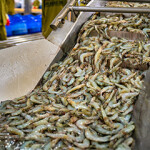FIP for small pelagics in Mauritania announced by SFP
The nonprofit Sustainable Fisheries Partnership (SFP) has announced the launch of a fishery improvement project (FIP) for small pelagic fisheries in the West African nation of Mauritania.
International fishing sector stakeholders, fishmeal and fish oil buyers, exporters, and processors, together with the Mauritanian fishery authority, signed a memorandum of understanding at the 2017 Seafood Expo Global in Brussels, Belgium on Friday, 27 April, marking the FIP’s official beginning.
“We’re delighted that the FIP model is being embraced in Western Africa,” said SFP Deputy Buyer Engagement Director Pedro Ferreiro said. “The collaborative and flexible approach to fishery sustainability a FIP brings seems to be appropriate for organizations working in these supply chains.”
In addition, Ferreiro said SFP will soon launch a “Mauritanian Octopus Supplier Roundtable” to promote sustainability in that fishery as well.
Although the Mauritanian small pelagic fishery does not yet have a finalized management plan, the country’s fisheries ministry said a legislative framework exists, according to SFP. A law establishing a code of fishing, its decree of application and several ordinances and decrees attached to it, was passed in 2015. The government also established a commission for fisheries management support and a National Commission for Sustainable Management of Small Pelagics in 2012.
According to SFP, other stakeholders directly involved with the FIP include le Ministère de Pêches et de l’Economie Maritime (MPEM), la Fédération Nationale des Pêches (FNP), la Section Industrie des Protéine de la Mer (SIPM), l’Institut Mauritanien de Recherche Océanographique et des Pêches (IMROP), l’Office Nationale d’Inspection Sanitaire des Produits de la Pêche et de l’Aquaculture (ONISPA), Rim Fish Meal, and OLVEA Group subsidiary Winterisation Mauritania.
“This collection of stakeholders allows for a holistic approach to improving the fishery, targeting its conservation, economic, and social objectives,” SFP said. “The organizations share a common commitment to sustainable fisheries and collaborating to publicly evaluate and improve the fishery.”
First steps for the FIP will be the development of a fishery assessment that will identify gaps to the IFFO RS standards, which govern sustainable sources of fishmeal. Workshops have been planned to take the initial evaluations forward to develop a FIP work plan and identify improvement actions., with the goal of eventually applying for and obtaining Marine Stewardship Council certification in the future.
OLVEA Fish Oils Sustainability Manager Antoine Dangy said he was looking forward to the first FIP meeting, scheduled for this summer in Nouakchott, the country’s capital.
”At OLVEA Fish Oils, we take responsible sourcing seriously and we are committed to promoting sustainable fishing wherever we are located and as our sustainable charter indicates,” Dangy said. “We have been working in Mauritania for five years, investing in partnerships with local enterprises and the national government to ensure we understand environmental impacts and act to minimize them. We recognized that a FIP was the most appropriate method for achieving our goals in Mauritania because of the partnership approach and method of continuous improvement.”






Share